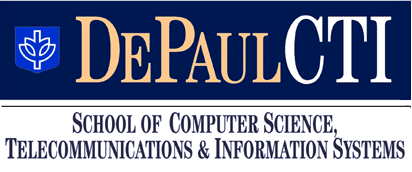
Codes
and Ciphers
CSC 233 (501)
Marcus
Schaefer
Latest additions
Assignments will be available
through this webpage. Written homework is due at the beginning of class.
If you hand in the homework late 10% will be taken off the score for each day.
Questions and Answers
-
There is a page with links
for further information.
-
You can rewatch the lectures online at
colweb
Schedule
Classes and office hours
The class meets MW 11:50-1:20 in CS&T 206.
My office hours are M 3:10-4:40 and W 10:10-11:40.
During that time you can find me in the CS&T building,
room 749.
If you want to set up an appointment at another time, or
simply ask a question,
send email to mschaefer@cdm.depaul.edu.
Textbook
As textbook we will use Simon Singh's The Code Book, Anchor 2000 (pb), or
Doubleday, 1999 (hc).
Syllabus
For general information, see the
official class
syllabus.
The following is a very rough schedule, and we might depart from it.
|
Week 1-4
|
Substitution and transposition ciphers (Mary, Queen of Scots, Arab
Cryptography, Vigenere cipher, Charles Babbage and the Playfair cipher)
|
|
Week 5-6
|
Cracking the Enigma (Alan Turing in Bletchley Park)
|
|
Week 7
|
Cryptanalysis and languages (Linear A/B, Rosetta Stone)
|
|
Week 8-9
|
Public Key Cryptography and Security protocols
|
|
Week 10
|
Quantum Cryptography
|
Midterm will take place in class on Monday, 2/11.
Homework, quizzes: 40%, Midterm: 30%, Final project: 30%.
Active participation in this class is expected, you are responsible for any
material you missed.
I will use the following grading scheme:
| Grade |
Percentage |
| A |
95-100 |
| A- |
90-95 |
| B+ |
87-90 |
| B |
83-87 |
| B- |
80-83 |
| C+ |
77-80 |
| C |
73-77 |
| C- |
70-73 |
| D+ |
65-70 |
| D |
60-65 |
| F |
<60 |
Throughout the quarter there will be extra credit problems; extra credit does
not directly make up for points lost on homeworks or exams; instead it is added
in with a weight at the end to adjust grades upwards.
Liberal Studies
CSC 233 is approved for credit in the Scientific Inquiry Domain under the Elective area.
Courses in the Scientific Inquiry Domain are designed to provide students with an opportunity
to learn the methods of modern science and its impact in understanding the world around us.
Courses in this domain are designed to help students develop a more complete perspective about science
and the scientific process, including:
- an understanding of the major principles guiding modern scientific thought
- a comprehension of the varying approaches and aspects of science
- an appreciation of the connection among the sciences and the fundamental role of mathematics in practicing science
- an awareness of the roles and limitations of theories and models in interpreting, understanding, and predicting natural phenomena
- a realization of how these theories and models change or are supplanted as our knowledge increases
Academic Honesty
- The course adheres to the university guideline on
Academic Integrity
Policy:
- Cheating is any action that violates university norms or
instructor's guidelines for the preparation and submission of
assignments. This includes but is not limited to unauthorized access to
examination materials prior to the examination itself; use or possession
of unauthorized materials during the examination or quiz; having someone
take an examination in one's place; copying from another student;
unauthorized assistance to another student; or acceptance of such
assistance.
- Plagiarism is a major form of academic dishonesty involving the
presentation of the work of another as one's own. Plagiarism includes,
but is not limited to the following:
- The direct copying of any source, such as written and verbal
material, computer files, audio disks, video programs or musical
scores, whether published or unpublished, in whole or part, without
proper acknowledgment that it is someone else's.
- Copying of any source in whole or part with only minor changes in
wording or syntax, even with acknowledgment.
- Submitting as one's own work a report, examination paper, computer
file, lab report or other assignment that has been prepared by
someone else. This includes research papers purchased from any other
person or agency.
- The paraphrasing of another's work or ideas without proper
acknowledgment.
- A charge of cheating and/or plagiarism is always a serious matter.
If proven, it can result in an automatic F in the course and possible
expulsion.
- The use of others' web/publication content (text, graphics, codes) is
regarded as plagiarism without giving credit (see the above description of
plagiarism).
- When you directly quote someone's work, you must put it in quotation
marks. Without such quotations and reference, it is regarded as an act of
plagiarism (see the above description of plagiarism).
- Using materials that the student prepared for other purposes (e.g.,
another course or for his/her work) needs the course instructor's prior
permission.
Incomplete
An incomplete grade is given only for an exceptional reason such as a death in
the family, a serious illness, etc. Any such reason must be documented. Any
incomplete request must be made at least two weeks before the final, and
approved by the Dean of the School of Computer Science, Telecommunications and
Information Systems. Any consequences resulting from a poor grade for the
course will not be considered as valid reasons for such a request.
Marcus Schaefer
Last updated: December 6th, 2007.

